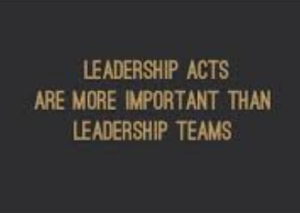People have been writing about leadership–what makes a good leader, what makes a bad one, and how come–since just about as long as there have been leaders. It’s only relatively recently that the study of leadership has taken a scientific turn. Now, behavioral scientists are discovering some dimensions of leadership that turn conventional wisdom sideways by counter-intuitive leaders.

A good leader needs to be extremely persuasive to get people to follow her and to push people hard to stretch what’s possible. That persuasion comes with expressing strong opinions. Think of the best leaders in history–Mandela, Churchill, King, etc.–and you’ll see a pattern: they tell great stories, with boldness, absolutely convinced that they are right. They both inspire and grab attention.
The problem with opinionated leaders is that even the smartest people get things wrong, and many leaders fear to change course once they’ve expressed an opinion for fear of appearing weak.
How can you apply counter-intuitive thinking to leadership? Leaders should not only share their vision for the future with the people within the company but also step back and engage employees during informal group meetings with questions such as, “Does this make sense for our organization?” and “What do you think?”
In the end, the organization rallies behind the leader, giving their all to make the vision a reality. When the top executive can get other believers to support his or her vision through counter-intuitive communication, those members of the constituencies will believe the vision is theirs as much as it is the leaders. The buy-in is increasingly higher, as the positive view of the vision increases exponentially. The constituents desire to make the vision their own.
These are eight counterintuitive habits displayed by truly authentic and enlightened leaders.
They help others succeed
Leadership is a team sport. Leaders only win when those around them succeed. There’s no shortage of personal development advice for leaders themselves, but experts largely agree that effective leadership also rests on developing others’ skills and talents.
And one of the main ways leaders empower others is by providing feedback. In one important study on expert performance, researchers found that learning and improvement slow down dramatically without competent feedback.
That makes intuitive sense as well. Consider those leaders who’ve brought out the best in you. They challenge you to strive for more than you’ve attained thus far and then help you acquire the knowledge and skills to accomplish what had previously been impossible. As Richard Branson has famously said, “Train people well enough so they can leave, treat them well enough, so they don’t want to.”

Employ advisors who can tell them why they are wrong
When you hold a certain belief or unconsciously decide on something, you’ll tend to focus on information that supports your belief or decision. You do it without even realizing it. Psychologists call this confirmation bias.
While this is a fundamentally human foible to which neither the brilliant nor the principled are impervious, unchecked in a leader or decision-maker it could lead to damaging – even catastrophic consequences.
Studies of the 1986 Challenger Disaster that killed all astronauts on board suggest that confirmation bias inherent in the decision-making process led to the egregious error in declaring the space shuttle safe for launch. This was despite awareness of a known (and ultimately fatal) variable that was dismissed by decision-makers as it conflicted with their line of thinking.
Authentic leaders ask their advisors always to empower them to speak to the power. Every important argument should be accompanied by the reasons why it could be wrong.
Warren Buffet counts on his vice-chairman, Berkshire Hathaway ‘s Charlie Monger, to point out flaws in his reasoning. “If I talk it through [with him], it’s because deep down I know I might be doing something dumb, and he’ll tell me,” Buffet shared recently on CNBC.
Don’t force motivation
Many leaders think it’s their job to keep team members continuously motivated. For many, this means either dangling a carrot or waving a stick. But the science cautions against both approaches.
The truth is that no one can motivate someone else to work hard.
The truth is that no one can motivate someone else to work hard. Sure, you can entice with monetary rewards or threaten repercussions for poor performance, but the effects of those tactics are temporary.
The only reason a leader should ever need to motivate someone to do their job is when they’ve hired someone who doesn’t like their role in the first place. As long as your team members are satisfied with their work they’re charged with doing, your job as a leader is simply to set clear expectations and equip them to carry them out.
To be great, they have to be bad

Leaders behind some of the world’s most successful companies know that to build great products or companies they have to choose areas in which to be weak deliberately.
Or as Harvard Business School’s Professor Frances Frei, best-selling author of Uncommon Service phrases it, “To be great, you have to be bad.”
What’s more, it’s about being unapologetic about it.
No company can provide a product or service that is the cheapest, fastest and of the highest quality. If they aim for all three, they’ll end with an offering that is, at best, mediocre.
Professor Frei cites Apple and Zappos as examples of companies that are deliberately bad in certain areas, to offer a product or service that is ultimately excellent.
Counter-intuitive leaders … serve others
Great leadership depends on trust. Leaders who are respected do what they promise, even when it’s hard. In fact, a survey of 1,000 senior public-sector administrators found that integrity was the most desired characteristic in leaders.
That might not be surprising, but it does hint at an important obligation that often goes overlooked: Leaders need to serve those they lead. Otherwise, the integrity that their success relies on can never be built or sustained.
We tend to admire leaders who serve their organizations’ interests, create value for shareholders, launch successful products, and interpersonal dynamics that make all that happen from within. Even the most headstrong leaders require the trust and collaboration of their teams, and that starts by looking out for their teams with real integrity.
They acknowledge that they are biased
Leaders who are aware of their hidden biases or ‘blind spots’ as Mahzarin Banaji, a professor of Social Ethics at Harvard calls it in her book, Blindspot: Hidden Biases of Good People, can be consciously on guard to ensure it doesn’t carry them in directions they don’t want to go.
“Eternal vigilance is a personal ideal that reduces the likelihood that our unconscious prejudices are influential in the things we do and how we construct our lives.”
Based on this awareness, authentic leaders can then take the steps needed to counter the effects of their biases and stereotypical beliefs.
Professor Iris Bohnet provides an example of changes that can be introduced in a workplace environment to initiate this.
“When we evaluate job applicants or make promotion decisions, we cannot help but be influenced by stereotypical beliefs about what a typical or ideal kindergarten teacher or professor looks (or should look) like. To hire and promote the best people rather than those who conform to our stereotypes, we need to change our evaluation procedures. For example, we have musicians audition behind curtains as many orchestras do, evaluate job candidates comparatively to increase the accuracy of our judgments, and hire and promote in bundles to allow for diversity to emerge.”
Counter-intuitive leaders … they are likable
The Machiavellian adage that it’s better to be feared than loved has always been a matter of debate. But there’s now a growing body of research suggesting that the great Italian thinker had it wrong.
In fact, effective leaders tend to be pretty likable. When people see their leaders favorably, they tend to work harder, more creatively, and more productively for them.
Above all else, leadership is relational.
Why? Because above all else, leadership is relational. All parties–leaders as well as those they lead–have to want to be in the relationship. If you’ve ever had a manager you dislike, you’ve probably spent plenty of time and energy resisting their directives that you could have used more productively.
They use their time well
Every leader has periods in their lives in which they find themselves “in the wilderness” – metaphorically speaking. Perhaps they’re out of favor (no one is infallible – everyone makes mistakes), out of office, stepped out of the limelight – or they just maybe at a junction in which they find themselves lost, confused and without direction.
According to Harvard’s David Gergen, a professor of public leadership and former advisor to four U.S presidents, these periods in the wilderness offer opportunity for growth, development and even reinvention, likely leading you on the path to becoming who you’re meant to be – your most authentic self.
The successful leaders used these times to learn new skills, forge new friendships and reinvent themselves. The more that you can use the difficult times in your life to dig deep and find new purpose or strength, the more resilient you will be.
The bottom line
Typically, articles or books about leadership begin with some definition of leadership. But, in keeping with the counterintuitive theme of this piece, I’m choosing rather end with one. Professor Frances Frei offers this:
“Leadership is about making others better as a result of your presence and making it last in your absence.”
Making it last in your absence. That counterintuitive nugget may well be the hallmark – and the legacy – of a truly authentic leader.

All you get is what you bring to the fight. And that fight gets better every day you learn and apply new ideas.
When things are not what you want them to be, what’s most important is your next step.
Test. Learn. Improve. Repeat.
Are you devoting enough energy to innovate your social media strategy?
Do you have a lesson about making your advertising better you can share with this community? Have any questions or comments to add to the section below?
Digital Spark Marketing will stretch your thinking and your ability to adapt to change. We also provide some fun and inspiration along the way.
More leadership material from Digital Spark Marketing’s Library:
Build an Effective Team by Being a Talent Hound
Success Enablers of Highly Creative Leaders
Secrets to Becoming a Remarkably Mindful Leader
Leadership Characteristics That Improve Influence |